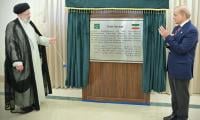This is what I got from the PTI’s first hundred days in power: that Imran Khan is a sincere, well-meaning and honest person who has reached the pinnacle of political power through his extraordinary capacity to persevere against the odds and rise against adversity. That part of his leadership is remarkable and worthy of emulation.
However, he doesn’t understand governance as well and may not have the right kind of people to take up various challenges in governance and set forth policy. He does not get helpful advice, and the coterie that surrounds him inhibits reaching out to those who can help him overcome the difficulties. For the moment, both aspects of his government – governance and functioning – stand poorly stalled.
Unable to fathom where to begin – that should mitigate the severity of the criticism that his government faces, as a culmination of repeated failures and mismanagement by previous governments have brought the country to this point – IK and his government are lost in the maze. Surprisingly unprepared for the task which was almost certain to fall their way given the politics preceding the elections, it turns out that most of his people were only paying lip service to what was to soon become their remit. Ill-prepared and shorn of the right capacity to deal with the issues at hand, they have forced IK on the defensive. What you get in replacement is a disproportionate emphasis on fighting corruption and fostering austerity; both are dual-edged in their impact on economy and mock performance claims of the PTI government with populist but infructuous resort. Instead, the people – the 99 percent others who constitute the poor – reel under unmitigated inflation.
Since self-proclamations were aplenty, soon the PTI government was put to test by the media and the opposition regarding the first hundred years. The six broad points placed before the people in a public address soon became a list of some 34 areas of detailed action which the government became accountable for, of its own free will! Clearly, only some of those could have been touched in the first hundred days while many are still in the works.
If the PTI had known that it would first need to know and then understand the enormity of the challenge, it could have first listed out what was possible and what wasn’t, and which of the possible were its priority. That would have made for a well-thought-out, integrated and profitable policy. Instead, the campaign rhetoric drove the impulse, strangling the PTI’s political capital and expending effort where none was needed.
Too much is wrong and the nation stands derailed in its journey; such has been the rot in the last 70 years. But what has been ruined – which is almost everything – cannot be put right or recovered in the next five. It will need a sustained, selfless effort by the next four to five governments to stem the rot; then only can we recover from the abyss. Of this, IK and his PTI have only the first five, for now. The work thus should have been prioritised and cut to the time available even if course-correction is what may have just touched some. But one man, his commitment and his energy can do only so much in a complex country of over 210 million people. It surely needs a more capable team to assist him in the task as the government struggles to chart a route out of the pervasive impasse.
So what could have been (and there is still time to right the course)? IK could have chosen five to six key areas and brought about an organisational and strategy structures with a specialized knowledge to assist the government with expert advice. Four of these are obvious and deal with the core issues. First, the economy: in all its related manifestations including macro-stability issues and economic strategies meant to trigger growth. Without ‘growth’ both the IMF and austerity through government will only mean a depressed economy for the period of IMF engagement.
Second is governance, an area which has suffered the most. Both state and society were compromised to familial and tribal interests as almost all government institutions were inducted to serve those in power. Third, institution-building. Since all stand badly compromised and politicised by the previous governments, the PTI is finding it difficult to find willing and capable bureaucrats. Lastly, there’s human development which would have entailed measures reaching out to the common man with delivery of their fundamental necessities long overlooked because governance, if any, remained patently elitist.
Surely, each of these would entail the responsible divisions leading the effort with other related divisions to chalk out an integrated plan of action necessitating complementary initiatives in education, health, clean drinking water, law and order etc. All of which contribute to a stable, law-abiding, responsible citizenry assured of its fundamental right to basic provisions. Just these four areas of functioning and responsible governance would consume five years while returning state and society to normalcy.
Instead, the list that the government has come out with is overwhelming because of its volume and diversity distracting the top leadership from the required focus on the essentials. Organisation 101, really. A distracted leadership is terrible for a political economy in dire straits and foretells of pervasive inaction since the focus isn’t right, regardless of how much animation is brought into the optics. This needs a rethink of the style of leadership and in organising governance – Achilles’ heel for the significant part of the last few decades.
Beyond the four it wouldn’t hurt to add a couple more especially if they contribute to the main themes; environment and tourism come to mind. These will add to the country’s economic potential. The six are comprehensive enough to touch most elements of governance and service provision to the people. IK’s recent escapades into poverty alleviation strategies – like the chicken and egg proposal or the buffalo initiatives – are not entirely out of place in modern theory and practice, as has been shown, citing Bill Gates’ initiatives. However, these became easy to mock on evening television shows because of the absence of a nuanced attachment of alleviating poverty as the principal objective.
There is a need for greater deliberation and reflection on why the government has not been able to break-out of its inaction in a substantive way; more so on basic governance and the economy. It must also reflect on how to avoid distraction, mostly self-generated, and how its focus must now turn on delivery alone. There is a desperate need for this government to reach out to those who can help, and give up on its self-imposed reticence. It must succeed, otherwise the future will be what the past was.
Email: shhzdchdhry@yahoo.com
An aeroplane of the national flag carrier of Pakistan is seen in this file photo. — AFPWhile Pakistan considers...
Representational image of a graph depicting various variables. — APP/FileInitiated by the centre and fiercely...
In this picture taken on April 16, 2023, people throng a market area during shopping in Lahore. — AFPOne of the...
Honour crimes also target men. In Sikandar Ali Lashari vs The State, SHC upheld conviction passed by ATC for honour...
If Sindh earmarks Rs20 million per police station, it will cost only Rs10 billion to make them effective first...
A complex and difficult policy environment seems to be highlighted by US’s recent application of sanctions on...







